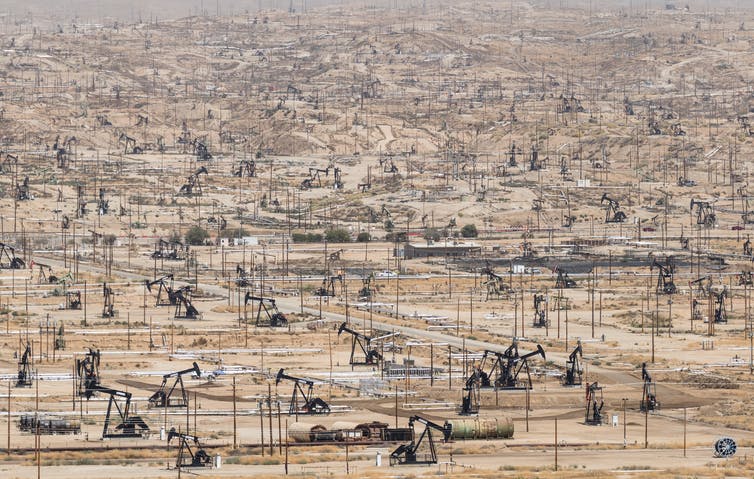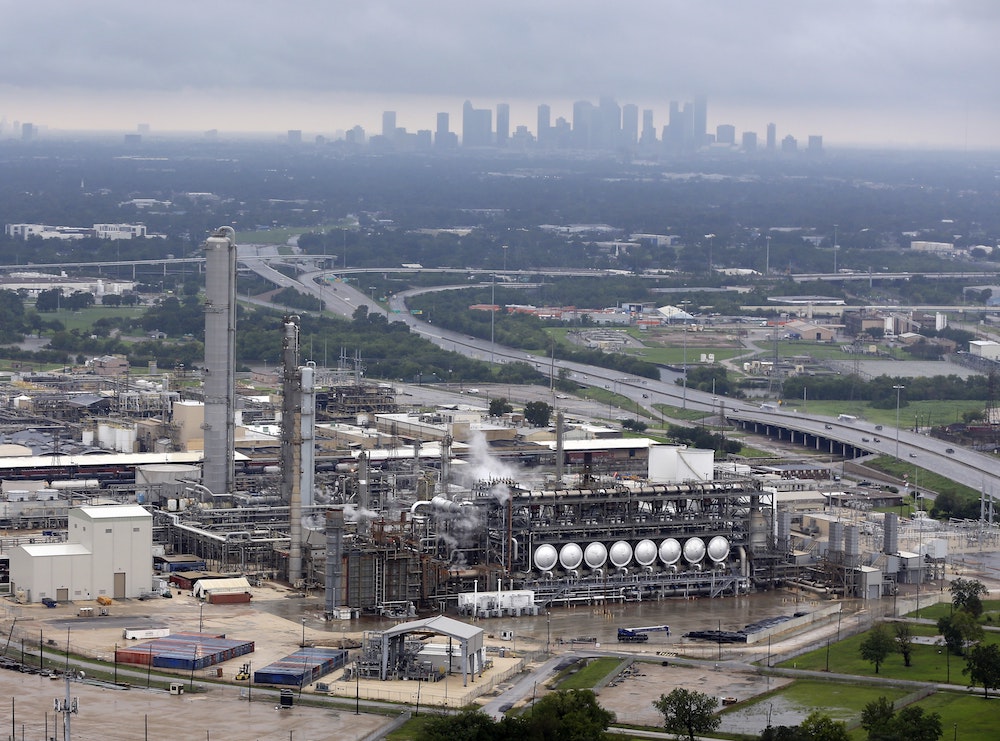Many Democratic lawmakers aim to pass a Green New Deal, a package of policies that would mobilize vast amounts of money to create new jobs and address inequality while fighting climate change.
Led by Rep. Alexandria Ocasio-Cortez and Sen. Ed Markey, they are calling for massive investments in renewable energy and other measures over a decade that would greatly reduce or even end the nation’s overwhelming reliance on fossil fuels.
As experts in environmental geography, sociology, and sustainability science and policy, we wholeheartedly support this effort. And, as we explained in a recently published study, climate change is not the only reason to ditch fossil fuels.
The coal, oil and natural gas industries are also major contributors to human rights violations, public health disasters and environmental devastation.
Sacrifice Zones
While conducting our research, we constantly encounter new evidence that depending on fossil fuels for energy harms people and communities at every point along fossil fuel supply chains, especially where coal, oil and natural gas are extracted.
Fossil fuels require what journalist Naomi Klein calls “sacrifice zones” — places and communities damaged or even destroyed by fossil fuel drilling and mining. But we have observed that politicians and other decision-makers tend to overlook these harms and injustices and that most energy consumers — meaning most people — are generally unaware of these issues.
We see no sign that decisions about new pipelines, power plants and other fossil fuel infrastructure account fully for the harms and costs of these industries to society and the toll taken on nature from pollution and other problems attributable to burning fossil fuels.
Burning coal, oil and natural gas is particularly bad for public health. This combustion generates a lot of air pollution, contributing to 7 million premature deaths worldwide every year.
One Duke University-led study of climate scientists determined that reducing greenhouse gas emissions in line with a goal of limiting global warming to 1.5 C, a level that scientists believe could avert disastrous consequences from climate change, would prevent 153 million premature deaths, largely by reducing air pollution.
Some communities are harmed more than others. For instance, EPA researchers studying data collected between 2009 and 2013 found that black Americans are exposed to 1.5 times more pollutants than white people.

Coal
More than 2,000 miners across Appalachia are dying from an advanced stage of black lung disease. This illness, also known as coal workers’ pneumoconiosis, comes from inhaling coal mine dust.
And thousands of coal miners have died horrible deaths from silicosis after inhaling tiny silicon particles in mines. And the communities where oil and gas is being extracted are exposed to water and air pollution that endangers their health, such as increasing the risk to certain childhood cancers.
Even living near coal mines or coal-fired power plants is a health hazard.
A team of Harvard school of public health scientists estimated that 53 premature deaths per year, 570 emergency room visits, and 14,000 asthma attacks annually could be attributed to pollution from a coal power plant in Salem, Massachusetts, one of the sites we studied.
What’s more, the people living within 30 miles of the coal plant, which was replaced with a natural gas-burning power station in 2018, were between two and five times more likely to get respiratory problems and other illnesses than those living farther away do.
But what we call the “hidden injustices” tied to Salem’s coal plant didn’t stop there.
The plant burned coal imported from La Guajira, Colombia, that was mined from Cerrejón, one of the world’s largest open-pit coal mines. That same mine has displaced thousands of indigenous people through physical force, coercion and the contamination of farmland and drinking water.
Natural Gas
As coal plants shut down, more natural gas is being burned. That should be cleaner and safer — right? Not exactly.
First, the methane and other greenhouse gases that leak from natural gas pipelines and other infrastructure mean that using gas warms the climate nearly as much as coal does.
Second, fracking, horizontal drilling and the other so-called unconventional methods for extracting natural gas and oil are introducing new dangers. There is growing evidence that living close to fracking sites causes various public health complications including: increased risk of birth defects, certain cancers, asthma and other respiratory ailments, earthquakes, and occupational health and safety problems like exposure to crystalline silica, a type of sand used during fracking.
Many of the Pennsylvanians we interviewed for our study told us that they feared for their health due to their potential exposure to the chemicals and toxicants used in fracking. Other research indicates that living near fracked natural gas wells can increase the probability of skin and respiratory conditions.
At every stage, natural gas operations can pollute water, air and land, harming ecosystems.
In California, a catastrophic natural gas leak at Aliso Canyon storage well in 2016 spewed as much pollution as some 600,000 cars would over a year. Hundreds of neighboring residents experienced nausea, headaches and other health problems.
Natural gas is also highly flammable. Two serious accidents in January 2019, the deadly gas explosions at a bakery in Paris and the more than 89 people killed in Tlahuelilpan, Mexico, highlighted how risky natural gas can be.
Here in the U.S., a series of deadly explosions and gas-fueled fires in September 2018 in the Merrimack Valley in Massachusetts intensified debates over the future of natural gas.
Oil
Despite global reliance on oil and petroleum products like plastics, oil extraction, whether through traditional drilling technology or fracking, is dangerous. Its distribution by pipelines, trains and trucks is also risky.
Decades of oil spills in Nigeria’s oil-rich Niger Delta has made the region one of the most polluted places on earth. And the mining of Canada’s tar sands has desecrated land belonging to First Nations, as most of the indigenous people of Canada are known.
In addition to the environmental devastation of massive oil spills like the Exxon Valdez and BP’s Deepwater Horizon Gulf oil spill of 2010, these leaks can cause pollution and serious health hazards.
Phasing out
Like virtually all environmental scholars, we consider global warming to be an urgent and existential threat. We recognize that replacing fossil-fuel infrastructure is an enormous endeavor. But the latest National Climate Assessment, a federal report predicting dire consequences from global warming, showed how ignoring this problem could cost more in the long term.
Based on our research, we believe that phasing out fossil fuels can improve public health, enhance human rights and empower communities politically. Moreover, a Green New Deal has the potential to create many jobs and enhance global stability.
As the debate about the Green New Deal takes shape, we hope that more lawmakers will recognize that above and beyond the benefits of a more stable climate, phasing out fossil fuels as soon as possible would also improve the lives of many vulnerable communities in the U.S. and around the world.
Noel Healy is Associate Professor of Geography at Salem State UniversityJennie C. Stephens is Dean’s Professor of Sustainability Science & Policy and Director of the School of Public Policy & Urban Affairs at the Global Resilience Institute at Northeastern UniversityStephanie Malin, is Associate Professor of Sociology at Colorado State University.
This article is republished from The Conversation under a Creative Commons license. Read the original article.
Main image: The Flint Hills Resources oil refinery, near downtown Houston. Credit: AP Photo/David J. Phillip
Subscribe to our newsletter
Stay up to date with DeSmog news and alerts







